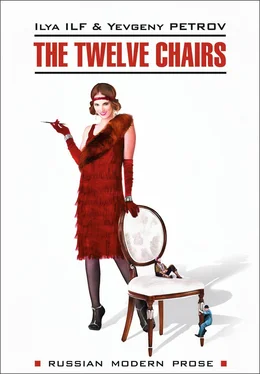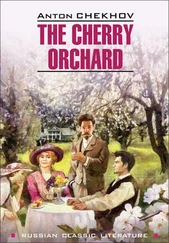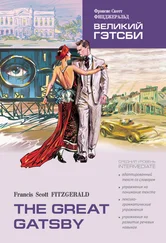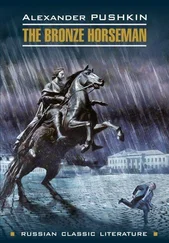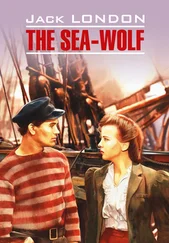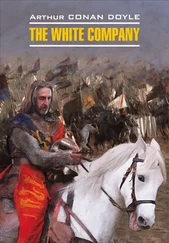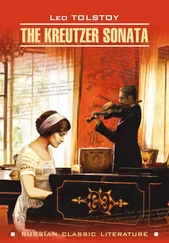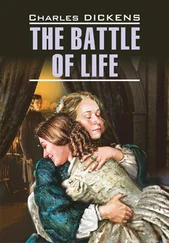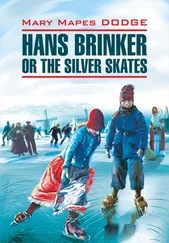Because of his great height, and particularly because of his moustache, Ippolit Matveyevich was known in the office as Maciste. Аlthough the real Maciste had no moustache. (Translator's Note: Maciste was an internationally known Italian actor of the time.)
Taking a blue felt cushion out of a drawer in the desk, Ippolit Matveyevich placed it on his chair, aligned his moustache correctly (parallel to the top of the desk) and sat down on the cushion, rising slightly higher than his three colleagues. He was not afraid of getting piles; he was afraid of wearing out his trousers-that was why he used the blue cushion.
All these operations were watched timidly by two young persons-a boy and a girl. The young man, who wore a padded cotton coat, was completely overcome by the office atmosphere, the chemical smell of the ink, the clock that was ticking loud and fast, and most of all by the sharply worded notice «Finish Your Business and Leave». The young man in the coat had not even begun his business, but he was nonetheless ready to leave. He felt his business was so insignificant that it was shameful to disturb such a distinguished-looking grey-haired citizen as Vorobyaninov. Ippolit Matveyevich also felt the young man's business was a trifling one and could wait, so he opened folder no. 2 and, with a twitch of the cheek, immersed himself in the papers. The girl, who had on a long jacket edged with shiny black ribbon, whispered something to the young man and, pink with embarrassment, began moving toward Ippolit Matveyevich.
«Comrade», she said, «where do we…»
The young man in the padded coat sighed with pleasure and, unexpectedly for himself, blurted out:
«Get married!»
Ippolit Matveyevich looked thoughtfully at the rail behind which the young couple were standing.
«Birth? Death?»
«Get married?» repeated the young man in the coat and looked round him in confusion.
The girl gave a giggle. Things were going fine. Ippolit Matveyevich set to work with the skill of a magician. In spidery handwriting he recorded the names of the bride and groom in thick registers, sternly questioned the witnesses, who had to be fetched from outside, breathed tenderly and lengthily on the square rubber stamps and then, half rising to his feet, impressed them upon the tattered identification papers. Having received two roubles from the newlyweds «for administration of the sacrament», as he said with a smirk, and given them a receipt, Ippolit Matveyevich drew himself up to his splendid height, automatically pushing out his chest (he had worn a corset at one time). The wide golden rays of the sun fell on his shoulders like epaulettes. His appearance was slightly comic, but singularly impressive. The biconcave lenses of his pince-nez flashed white like searchlights. The young couple stood in awe.
«Young people», said Ippolit Matveyevich pompously, «allow me to congratulate you, as they used to say, on your legal marriage. It is very, very nice to see young people like yourselves moving hand in hand toward the realization of eternal ideals. It is very, ve-ery nice!»
Having made this address, Ippolit Matveyevich shook hands with the newly married couple, sat down, and, extremely pleased with himself, continued to read the papers in folder no. 2. At the next desk the clerks sniggered into their inkwells. The quiet routine of the working day had begun. No one disturbed the deaths-and-marriages desk. Through the windows citizens could be seen making their way home, shivering in the spring chilliness. At exactly midday the cock in the Hammer and Plough cooperative began crowing. Nobody was surprised. Then came the mechanical rattling and squeaking of a car engine. A thick cloud of violet smoke billowed out from Comrade Gubernsky Street, and the clanking grew louder. Through the smoke appeared the outline of the regional-executive-committee car Gos. No. 1 with its minute radiator and bulky body. Floundering in the mud as it went, the car crossed Staropan Square and, swaying from side to side, disappeared in a cloud of poisonous smoke. The clerks remained standing at the window for some time, commenting on the event and attempting to connect it with a possible reduction in staff. A little while later Bezenchuk cautiously went past along the footboards. For days on end he used to wander round the town trying to find out if anyone had died.
The working day was drawing to a close. In the nearby white and yellow belfry the bells began ringing furiously. Windows rattled. Jackdaws rose one by one from the belfry, joined forces over the square, held a brief meeting, and flew off. The evening sky turned ice-grey over the deserted square.
It was time for Ippolit Matveyevich to leave. Everything that was to be born on that day had been born and registered in the thick ledgers. All those wishing to get married had done so and were likewise recorded in the thick registers. And, clearly to the ruin of the undertakers, there had not been a single death. Ippolit Matveyevich packed up his files, put the felt cushion away in the drawer, fluffed up his moustache with a comb, and was just about to leave, having visions of a bowl of steaming soup, when the door burst open and Bezenchuk the undertaker appeared on the threshold.
«Greetings to an honoured guest», said Ippolit Matveyevich with a smile. «What can I do for you?»
The undertaker's animal-like face glowed in the dusk, but he was unable to utter a word.
«Well?» asked Ippolit Matveyevich more severely.
«Does the Nymph, durn it, really give good service?» said the undertaker vaguely. «Can they really satisfy customers? Why, a coffin needs so much wood alone».
«What?» asked Ippolit Matveyevich.
«It's the Nymph…. Three families livin' on one rotten business. And their materials ain't no good, and the finish is worse. What's more, the tassels ain't thick enough, durn it. Mine's an old firm, though. Founded in 1907. My coffins are like gherkins, specially selected for people who know a good coffin».
«What are you talking about? Are you crazy?» snapped Ippolit Matveyevich and moved towards the door. «Your coffins will drive you out of your mind».
Bezenchuk obligingly threw open the door, let Vorobyaninov go out first and then began following him, trembling as though with impatience.
«When the Do-Us-the-Honour was goin', it was all right There wasn't one firm, not even in Tver, which could touch it in brocade, durn it. But now, I tell you straight, there's nothin' to beat mine. You don't even need to look».
Ippolit Matveyevich turned round angrily, glared at Bezenchuk, and began walking faster. Although he had not had any difficulties at the office that day, he felt rotten.
The three owners of the Nymph were standing by their establishment in the same positions in which Ippolit Matveyevich had left them that morning. They appeared not to have exchanged a single word with one another, yet a striking change in their expressions and a kind of secret satisfaction darkly gleaming in their eyes indicated that they had heard something of importance.
At the sight of his business rivals, Bezenchuk waved his hand in despair and called after Vorobyaninov in a whisper: «I'll make it thirty-two roubles». Ippolit Matveyevich frowned and increased his pace. «You can have credit», added Bezenchuk. The three owners of the Nymph said nothing. They sped after Vorobyaninov in silence, continually doffing their caps and bowing as they went.
Highly annoyed by the stupid attentions of the undertakers, Ippolit Matveyevich ran up the steps of the porch more quickly than usual, irritably wiped his boots free of mud on one of the steps and, feeling strong pangs of hunger, went into the hallway. He was met by Father Theodore, priest of the Church of St. Frol and St. Laurence, who had just come out of the inner room and was looking hot and bothered. Holding up his cassock in his right hand, Father Theodore hurried past towards the door, ignoring Ippolit Matveyevich.
Читать дальше
